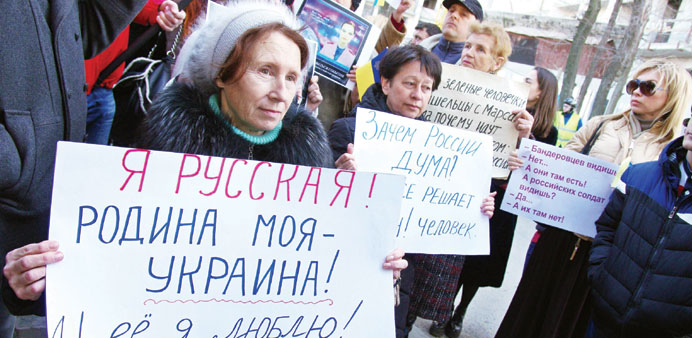A woman holds a placard reading “I am Russian. My homeland is Ukraine and I love her” during a rally at the Russian consulate in the Black Sea Ukrainian city of Odessa.
AFP
Overshadowed by a vehement pro-Russian camp, those who would like to see the eastern city of Donetsk remain part of Ukraine are struggling to make themselves heard.
They are a minority voice in a region that is mostly Russian-speaking and closer to the Russian border than to Kiev, where pro-European demonstrators ousted pro-Kremlin president Viktor Yanukovych last month.
“People are afraid to protest,” said Tetyana Zarovna, a Donetsk journalist who is active in the anti-Yanukovych movement born on Kiev’s Independence Square, or Maidan, in November.
Some 10,000 pro-Moscow demonstrators filled the streets of Donetsk on Sunday, loudly calling for the Donbas mining region to become part of Russia, just like Ukraine’s southern peninsula of Crimea, which will hold a referendum on Sunday on joining the Russian Federation.
A rival pro-Kiev rally had to be cancelled at the last minute over security fears.
Former boxer turned politician Vitali Klitschko, a pro-European campaigner and candidate in May 25 presidential elections, was scheduled to attend the demonstration but left town without meeting supporters, as opponents chanted “Donetsk, Russian city!” and “Putin for president!”.
On March 5 however, a pro-Kiev rally drew some 5,000 people, an unexpectedly high number in a city that used to be a bastion of support for Yanukovych and where local politicians and media outlets are endlessly condemning the Kiev demonstrators as neo-Nazi radicals.
The Donetsk protest escalated into an all-out punch-up when the demonstrators crossed paths with a pro-Russian crowd that had set up camp on the city’s central Lenin Square. “They threw eggs, apples and firecrackers at us,” said Zarovna, fuming.
“Local elites and the media backed Yanukovych’s regime and whipped up tensions, leading to the current confrontations,” said political expert Volodymyr Kipen.
Unlike in Crimea - where the local parliament voted Tuesday for independence from Ukraine - the main political forces in Donetsk oppose annexation by Russia so the threat of separatism is relatively small, Kipen said.
The industrial Donetsk region is also host to powerful financial clans who are advocating for national unity, such as the new Kiev-appointed governor Sergiy Taruta and Ukraine’s richest man Rinat Akhmetov, the owner of top football club Shakhtar Donetsk. The club’s supporters now provide security for pro-Kiev demonstrators.
For one of the movement’s organisers, Enrique Menendez - whose name comes from a Spanish grandfather - the March 5 protest was a “historic moment,” showing that a significant part of the Donetsk population was against joining forces with Moscow.
The young man, who owns an advertising agency, stressed however that he did not fully support the Maidan movement in Kiev, whose three months of protests resulted in some 100 deaths before bringing down the Yanukovych regime and triggering Russian forces to seize de facto control of Crimea.
The Maidan demonstrators prioritised overthrowing the government over European Union integration, he said, calling for greater autonomy for Donetsk rather than attachment to Russia.
“You have to understand that Donetsk has always felt unloved, the authorities never had a plan for the southeast,” he said.
Even though the deposed president hails from the region, “Yanukovych never did anything for us,” he added, echoing local disillusion with Kiev and the west of the country.
Ukraine’s rust belt, known for its coal mining and steel industry, was a vital region under the former Soviet Union but now feels forgotten, and many in the Donetsk area fear the industrial heartland may fall apart entirely if ties with neighbouring Russia are broken.
“Men work here in mines and in factories, they do difficult work and all the money goes to western Ukraine,” fumed Valentina, a pro-Russian protester, reiterating a widely held view in the city.
Many also voiced resentment at a recent attempt by Kiev’s new Western-backed authorities to scrap a law making Russian an official language in the region.
In a declaration published this week on a local pro-European website, ostro.org, Donetsk activists called for national unity but warned they wanted to keep Kiev at arm’s length.
“We have much to reproach Kiev for,” they wrote, calling for discussions aimed at keeping more of Donetsk’s money in the region.
“But that will be for tomorrow. Today, the enemy is at the gates,” they warned.

